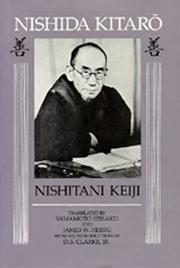| Listing 1 - 10 of 57 | << page >> |
Sort by
|
Dissertation
ISBN: 9781544807805 1544807805 Year: 2016 Publisher: Nagoya, Japan Chisokudo
Abstract | Keywords | Export | Availability | Bookmark
 Loading...
Loading...Choose an application
- Reference Manager
- EndNote
- RefWorks (Direct export to RefWorks)
Nishidas Philosophie zeigt sich durch seine Sprachform als eine sich selbst umformende und sich dabei selbst erweiternde und ausdehnende Form des Denkens, die jedoch in ihrem Kern ein gleichbleibendes Fundament zu haben scheint. Man kann hinsichtlich dieses Fundaments oder Ursprungs sagen, dass sich die Themen seiner Philosophie zwar seit der Studie über das Gute gewandelt haben, der Ausgangspunkt seines Denkens und das, was im Grunde seines Philosophierens zur Sprache kommen will, jedoch unverändert aktuell geblieben sind. Gewandelt haben sich lediglich die Formen, in denen es zur Sprache kommt, und mit ihnen die Tiefe und Intimität zwischen Nishida und dem, was er sagen will und was Nishida das Unaussprechliche oder Formlose nannte.

ISBN: 0520073649 9780520073647 Year: 1991 Publisher: Berkeley University of California press
Abstract | Keywords | Export | Availability | Bookmark
 Loading...
Loading...Choose an application
- Reference Manager
- EndNote
- RefWorks (Direct export to RefWorks)
In recent years several books by major figures in Japan's modern philosophical tradition have appeared in English, exciting readers by their explorations of the borderlands between philosophy and religion. What has been wanting, however, is a book in a Western language to elucidate the life and thought of Nishida Kitaro (1870-1945), Japan's first philosopher of world stature and the originator of what has come to be called the Kyoto School. No one is more qualified to write such a book than Nishitani Keiji, whose lifetime coincides with the rise and flowering of the Kyoto School and whose own critical contribution to Japanese thought has been so important. "Nishida Kitaro" is a translation of essays Nishitani wrote about his teacher from 1936 to 1968 and published as a book in 1985. This series of meditations by one master on another provides a remarkable, living portrait of Nishida the person and conveys the enthusiasm he aroused in his students. Examining Nishida's most important work, "An Inquiry into the Good", Nishitani penetrates to the core of his thought and presents it in language that is a marvel of clarity.
Nishida, Kitarō, --- Nishida, Kitaro --- Kitarō, Nishida --- Nishida, Kitarō, --- Kitaro, Nishida, --- 西田幾多郎, --- 西田几多郎, --- Nishida, Kitarō, - 1870-1945
Book
ISBN: 2296038727 9782296038721 Year: 2007 Publisher: Paris: L'Harmattan,
Abstract | Keywords | Export | Availability | Bookmark
 Loading...
Loading...Choose an application
- Reference Manager
- EndNote
- RefWorks (Direct export to RefWorks)
On connaît la célèbre aporie du temps qui a pris figure de lieu commun depuis Aristote : le passé n'est plus et le futur n'est pas encore ; quant à l'instant présent qui sépare le futur du passé, il s'en va immédiatement rejoindre le passé. De Platon à Plotin, en passant par le grand moment augustinien, et jusqu'à Husserl et Heidegger, cette aporie fut sans cesse reprise et solutionnée d'autant de manières. Il n'est pas étonnant, dans ces conditions, que le problème du temps sut attirer l'attention de NISHIDA Kitarô (1870-1945), qui, tout en se situant dans ce grand courant de pensée, fut en mesure de le réinterpréter et de lui apporter une configuration originale à l'aide de la logique du basho (lieu). Considérée dans ses liens à la notion d'auto-éveil (jikaku), la temporalité nishidienne conduit à une nouvelle conception du présent, à un soi plus originaire et plus attentif à son agir dans le moment présent, de même qu'à l'importance des thèmes de l'individualité et de l'altérité.
Book
ISBN: 9784588150371 4588150375 Year: 2004 Publisher: Tōkyō : Hōsei Daigaku Shuppankyoku,
Abstract | Keywords | Export | Availability | Bookmark
 Loading...
Loading...Choose an application
- Reference Manager
- EndNote
- RefWorks (Direct export to RefWorks)
Book
ISBN: 3957439930 Year: 2015 Publisher: Münster : Mentis,
Abstract | Keywords | Export | Availability | Bookmark
 Loading...
Loading...Choose an application
- Reference Manager
- EndNote
- RefWorks (Direct export to RefWorks)
Kitarô Nishida (1870-1945) ist der Begründer der 'Kyôto-Schule' und gilt als Vater der modernen japanischen Philosophie. In seiner Ontologie denkt er Realität in ihrer Struktur nicht gegenstands- oder sachlogisch, sondern grundlegend feldhaft und relational. Für ihn erhalten Dinge oder Vorgänge erst ihre Realität durch ein zugrundeliegendes und permanent produktives, rein gegenwärtiges und endlos dynamisches Feld absoluter Relationalität. In diesem Buch wird die naturphilosophische Tiefe dieses Gedankens ausgelotet. Dabei wird deutlich, dass Nishida in seinem Spätwerk seinen philosophischen Gedanken auch anhand der modernen Physik und Quantenmechanik zu veranschaulichen versuchte, einer lebenslangen mathematischnaturwissenschaftlichen Neigung Folge leistend. Nishida selbst erscheint dabei in völlig neuem Licht als naturwissenschaftlich-positivistisch orientierter, eorealistischer Denker, ohne aber gefangen zu sein in Begriffen und Weltbildern westlicher Wissenschaftstradition. Statt dessen erarbeitet er ein neuartiges Grundparadigma, das in seiner Anwendung weit über den engen Bereich der Physik hinausgehen kann und dessen Umrisse in dieser Studie veranschaulicht werden.
Physics --- Philosophy. --- Nishida, Kitarō,
Book
ISBN: 0824873890 Year: 2005 Publisher: Honolulu : University of Hawaii Press,
Abstract | Keywords | Export | Availability | Bookmark
 Loading...
Loading...Choose an application
- Reference Manager
- EndNote
- RefWorks (Direct export to RefWorks)
The writings of Nishida Kitarô, whose name has become almost synonymous with Japanese philosophy, continue to attract attention around the world. Yet studies of his thought in Western languages have tended to overlook two key areas: first, the influence of the generation of Japanese philosophers who preceded Nishida; and second, the logic of basho (place), the cornerstone of Nishida's mature philosophical system.The Logic of Nothingness addresses both of these topics. Robert Wargo argues that the overriding concern of Nishida's mature philosophy, the attempt to give a reasonable account of reality that includes the reasonableness of that account itself-or what Wargo calls "the problem of completeness"-has its origins in Inoue Enryo's (1858-1919) and Inoue Tetsujiro's (1855-1944) preoccupation with "the problem of standpoints." A translation of one of Nishida's most demanding texts, included here as an appendix, demonstrates the value of Wargo's insightful analysis of the logic of basho as an aid to deciphering the philosopher's early work.
Book
ISBN: 9782296038738 2296038735 Year: 2007 Publisher: Paris: L'Harmattan,
Abstract | Keywords | Export | Availability | Bookmark
 Loading...
Loading...Choose an application
- Reference Manager
- EndNote
- RefWorks (Direct export to RefWorks)
Nishida Kitaro (1870-1945) commence à être bien connu dans la francophonie. Pourtant, il manquait encore une introduction à sa pensée qui pût servir à la fois de guide et d'outil tant pour les chercheurs que pour les étudiants. On trouvera donc dans ce livre un tour d'horizon des recherches actuelles dans la francophonie concernant ce philosophe, des pistes de recherche montrant les champs d'application possibles de sa pensée dans d'autres disciplines des sciences humaines, de même qu'une explication détaillée de la notion centrale de sa philosophie, celle de basho (lieu). Suivent un glossaire français-japonais détaillé de la langue philosophique de Nishida, de même qu'une bibliographie exhaustive.
Philosophy, Japanese --- Nishida, Kitarō, 1870-1945 --- Nishida, Kitarō, - 1870-1945

ISBN: 1933146281 9781933146287 Year: 2007 Publisher: Bethesda: Academica press,
Abstract | Keywords | Export | Availability | Bookmark
 Loading...
Loading...Choose an application
- Reference Manager
- EndNote
- RefWorks (Direct export to RefWorks)
Book
ISBN: 9781973929567 1973929562 Year: 2017 Volume: 13 Publisher: Nagoya, Japan : Chisokudō,
Abstract | Keywords | Export | Availability | Bookmark
 Loading...
Loading...Choose an application
- Reference Manager
- EndNote
- RefWorks (Direct export to RefWorks)
The first of 3 volumes of essays on Japanese philosophy, this work brings together essays that clarify its heritage and its practice, above all in the dynamic thought of Nishida Kitarō. Showing how philosophy takes shape through the translation of language and culture, the author examines the frameworks that have defined and confined Nishida’s thought and then charts new avenues of questioning Nishida and letting him question us.How should we envision the world at a time of environmental crisis, how might we rethink our conceptions of history, religion and God; how is bodily awareness a way that the world knows itself, and just what can we make of Nishida’s famous notion of nothingness--these are some of the questions that guide the meticulous explorations in this collection.
Philosophy, Japanese. --- Nishida, Kitarō, --- Philosophy, Japanese --- Nishida, Kitarō, --- Nishida, Kitarō, - 1870-1945
Book
ISBN: 9782760636729 2760636720 Year: 2016 Publisher: Montréal : Les Presses de l'Université de Montréal,
Abstract | Keywords | Export | Availability | Bookmark
 Loading...
Loading...Choose an application
- Reference Manager
- EndNote
- RefWorks (Direct export to RefWorks)
Dans ce livre au style très personnel, Jacynthe Tremblay relate la manière dont sa vie a été profondément marquée par sa rencontre avec le philosophe japonais Nishida Kitarō (1870-1945) au fil de son histoire quotidienne longue de deux décennies au Japon et en Chine. On y retrouvera des détails de la vie du philosophe, des exemples tirés de la culture japonaise ou encore des réflexions sur la musique de Bach, qui forment un cadre cohérent pour appréhender la pensée nishidienne. C'est ainsi que l'on pourra comprendre les concepts, déterminants, du «lieu» et de l'«altérité absolue», qui ont pour fonction de montrer comment l'être humain - dégagé d'une subjectivité autocentrée - peut entrer en relation avec les autres. Ainsi abordée, la philosophie de Nishida, selon l'interprétation simple mais très audacieuse qu'en fait l'auteur, devient accessible à tous et rejoint la densité de la vie.
Other (Philosophy) --- Place (Philosophy) --- Nishida, Kitarō, --- Lieu (Philosophie) --- Altérité. --- Nishida, Kitarō, --- Nishida, Kitarō, - 1870-1945
| Listing 1 - 10 of 57 | << page >> |
Sort by
|

 Search
Search Feedback
Feedback About UniCat
About UniCat  Help
Help News
News